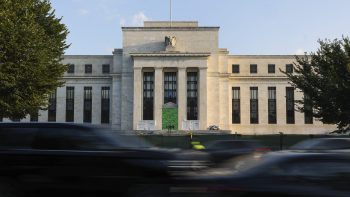Treasury, banks negotiate stress tests
TEXT OF INTERVIEW
Kai Ryssdal: You remember the TARP? The Troubled Asset Relief Program, the original bank bailout? One of the first things the Obama administration wanted to do was convince us it was working. That the basic plan to give banks more money was the right way to go. So almost three months ago the secretary of the Treasury ordered up these things called stress tests. And yeah, you can think of them as the financial equivalent of running on a treadmill. Exams that are supposed to give us an idea of whether a given bank has enough cash to keep going.
I said they’re supposed to give us an idea because we don’t know yet. The grades were supposed to come out today. But they keep getting delayed as bank executives try to convince the Treasury Department to give them passing scores, that the banks don’t need more capital. Adam Posen is the deputy director of the Peterson Institute for International Economics in Washington D.C. Adam, it’s good to have you with us.
ADAM POSEN: Thanks for having me, Kai.
Ryssdal: This new capital that the banks are going to have to come up with. Some of them, anyway, depending on these results come Thursday. Is that going to be public money? That is to say taxpayer money, or is it going to be new capital raised in the markets?
POSEN: That’s your first question as to whether the tests are real, and people believe them. If people in the markets and investors believe the tests give accurate information and the situation is stabilizing then new private money will come in. If, on the other hand, it’s just the U.S. government converting the preferred shares they already have into common stock, or adding money out of the TARP through some shell game, then it says the markets don’t really believe in it, and that’s a bad verdict.
Ryssdal: What hangs in the balance here? What depends on these grades? What will or won’t happen when these grades are announced?
POSEN: Ideally what would happen if the tests were accurate, is yes, it would punish the stock prices of those banks that are clearly undercapitalized. It would lead to market pressure through the stock price, through other kinds of lending on these banks to hurry up and get some capital. Not “yo di do” take six months to find it. And it would ideally free up lending for some of the other banks who if markets believed these banks really got a clean bill of health, they could sorta go back to normal and go back to lending the way they used to.
Ryssdal: Are we reading this right that the government is negotiating with the banks over the state of these reports?
POSEN: The government is grading on the curve, and a couple of the big banks are being grade grubbers, so they’re whining about getting an easier touch on their exams than they otherwise would deserve. But, in a sense, it’s kinda beside the point, because the whole test is aimed towards giving everyone a pass.
Ryssdal: If we know, though, what the results are going to be, as you said, what’s everyone waiting for? Why not just get it out on the table, and let us know what the health of the financial sector is and then we can either fix it and move on, or have some really big crisis and move on?
POSEN: Well, I don’t think the stress test is going to be the cause for another crisis but that’s not because the problem is fixed. The most cynical people would have said oh, they’re just going to say everybody is OK, and they would maybe ask more capital for Citi since they already own such a big piece. And pick one of the smaller of the 19 banks and let everyone else off. So they are being tougher verbally than what some of the most cynical observers would have predicted. It is kinda funny what’s the point of all this because they’re doing it as though it’s a technical fix, so there’s a specific number these banks need. Whereas what they need is a political pushback saying no more negotiations, you guys have to sell the stuff at prices you don’t like.
Ryssdal: Sell the stuff, these toxic assets, right?
POSEN: Exactly. The bad assets on the books.
Ryssdal: If in the face of the worst crisis in generations, the government can’t do what it wants with regard to the banks. Does that suggest to you that the banking industry is too powerful, has too many friends?
POSEN: I think that’s part of it. I think, yes, bankers have influence, but it’s more they’re trying to take advantage of the situation that the government doesn’t want failures and the anger in the populace because in the end current bank shareholders and current bank management do best if nothing happens.
Ryssdal: Adam Posen is the deputy director of the Peterson Institute for International Economics in Washington, D.C. Adam, thanks a lot.
POSEN: Thank you.
There’s a lot happening in the world. Through it all, Marketplace is here for you.
You rely on Marketplace to break down the world’s events and tell you how it affects you in a fact-based, approachable way. We rely on your financial support to keep making that possible.
Your donation today powers the independent journalism that you rely on. For just $5/month, you can help sustain Marketplace so we can keep reporting on the things that matter to you.


















